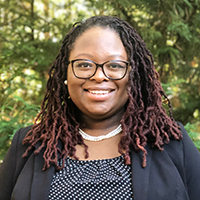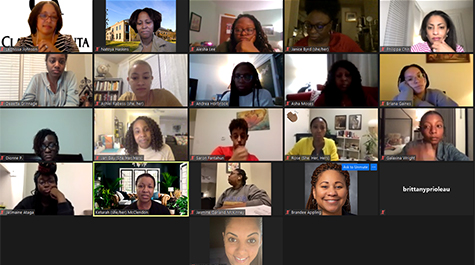Natoya Haskins launches national affinity group for Black women in counselor education
Black women remain starkly underrepresented in academia, making up just 3% of faculty at colleges and universities nationwide. These scholars face unique and significant challenges, from overt racism and discrimination to stereotyping, imposter syndrome and isolation.
 Natoya Haskins, associate professor of counselor education and director of diversity and inclusion for the School of Education, has focused much of her research on the lived experiences of Black women within counseling, as well as strategies to support the advancement of students and professionals in the field. This fall, she launched Metamorphosis, a national affinity group for Black women pursuing graduate degrees in counseling.
Natoya Haskins, associate professor of counselor education and director of diversity and inclusion for the School of Education, has focused much of her research on the lived experiences of Black women within counseling, as well as strategies to support the advancement of students and professionals in the field. This fall, she launched Metamorphosis, a national affinity group for Black women pursuing graduate degrees in counseling.
“Our goal is to foster an atmosphere where individuals feel validated and able to speak without fear or defensiveness,” says Haskins. “A community that allows participants to talk about feelings of pain, isolation and invisibility — and creates space for safety, where they can take off the mask that they may wear.”
The idea for the group stems from experiences Haskins had as a faculty member at the University of Georgia, where she started an on-campus affinity group for Black students in counseling. The program ran for three years, until Haskins joined the faculty at her alma mater William & Mary. Since then, she has wanted to continue the program in a virtual format, allowing students and academics across the nation to participate. With the pandemic forcing most interaction online and national events sparking much-needed conversations about race, 2020 seemed like the perfect time to make it happen.
“How do we break down these walls? How do we position Black women to move into positions of leadership?” asks Haskins. “According to countless studies, Black women in the academy continue to be the lowest on the totem pole. Now is the time to find space for them and this is one way we’re supporting Black women in a tangible way.”
Three months into the project, the group now connects about 20 participants through monthly meetings and group chats for mentoring and mutual support. There are plans to organize writing retreats and seek grants to support students doing research and presenting at conferences.
 Philippa Chin M.Ed. ’19, Ph.D. ’23 is a doctoral student in counselor education and is serving on the planning group for the project. “The spaces I experience are usually ones in which I am the only Black student, the only Black therapist, the only Black parent or the only Black employee,” says Chin. “Being in this space with all these ladies is both extremely comforting and confirming of my right to become a counselor educator.”
Philippa Chin M.Ed. ’19, Ph.D. ’23 is a doctoral student in counselor education and is serving on the planning group for the project. “The spaces I experience are usually ones in which I am the only Black student, the only Black therapist, the only Black parent or the only Black employee,” says Chin. “Being in this space with all these ladies is both extremely comforting and confirming of my right to become a counselor educator.”
An important goal of the project is to connect scholars for likeminded research, particularly in the areas of equity and social justice. Haskins also co-directs the Social Justice and Diversity Research Fellowship, a program housed in the School of Education that connects students from across the university to advance research in the areas of social justice and diversity. Both programs seek to help students develop skills, build relationships and find ways to connect with others in the field.
“These projects are an extension of my research and service,” says Haskins. “We know what the research says and we know what needs to be done to support our faculty and students of color. Now is the time to create something that is meaningful and will effect lasting change.”
Participants in the affinity group report a feeling of being lifted by the experience, pointing to the need for a strong sense of community to mitigate the harm of marginalization. It also reinforces the need for a more diverse faculty, says Haskins.
 When Aiesha Lee Ph.D. ’22 learned about the group forming, she felt it was something she had to get involved in to provide and be a part of a safe space for Black women. “Seeing other women show up and persevere has helped me continue to show up and persevere as a student and professional, specifically during our current social and political climate,” she says.
When Aiesha Lee Ph.D. ’22 learned about the group forming, she felt it was something she had to get involved in to provide and be a part of a safe space for Black women. “Seeing other women show up and persevere has helped me continue to show up and persevere as a student and professional, specifically during our current social and political climate,” she says.
Above all, students are grateful for the opportunity to discover that others share many of their feelings and experiences — a validation of both the challenges and possibilities of being a Black woman in academia.
“The group has helped me to realize that as a student, I am not the only one experiencing the intersectionality of the identities of being Black, woman, and a professional in the counseling field,” says Chin. “The complexity of each identity is undeniably challenging, and so the affinity group has provided a supportive environment to talk through these situations and develop a sense of belonging.”
Dr. Haskins recently presented “African American Women in Counselor Education” as part of the 2020-2021 W&M School of Education Faculty Research Talks. She discussed her research, including her most current scholarship using Womanism as a clinical paradigm and structural support for African American women in counseling and in counselor education. Watch the talk on demand now.
